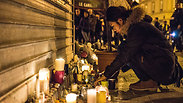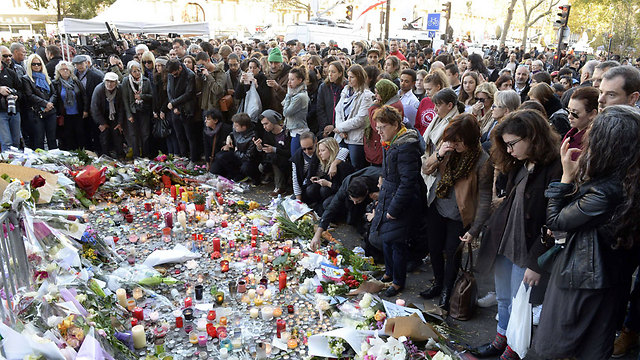
Defeating terror the Parisian way
Nahum Barnea joins French citizens of all ages, religions and ethnic groups as they take to the streets of Paris following Friday night's terror offensive, vowing that 'life will win.'
It was a drowsy morning, like Sunday mornings usually are in France. In the afternoon, people filled up the streets. The traffic was particularly evident near the sites which turned into scenes of terror on Friday night. Thousands arrived to place white roses, candles, prayer notes. The French version of the "candle youth" is not just youth: It includes people of all ages, all religions, all ethnic groups.
People said to me again and again on Sunday, both near the sites of the terror attacks and far from them: "We will defeat terror our way - the Parisian way. We will go back to our routine life in spite of the terrorists. Life will win."
It is already winning. I am writing these words from a table at Café de Flore on Boulevard Saint-Germain. The café is packed, although Sunday evening is considered a weak day. It is packed also on the outside, in a place where the next terror attack could allegedly take place.

Since the terror offensive, police have blocked the section of Boulevard Voltaire facing the Bataclan theater, the place which claimed most of Friday night's victims. Unlike us, the French are in no rush to erase the damages of their terror attacks. They prefer to sanctify them in ceremonies.
On the corner of Rue Richard Lenoir and Boulevard Voltaire, in the sterile area, about 30 young people, relatives and friends of the victims, stand in a wide circle, hand shaking hand. They are silent. After long minutes of silence, they embrace and gather in a small circle, head to head. Some cry.
About 100 young people, relatives and friends of the victims, are organizing a march of mourning. Each one of them holds a white rose. They walk along Boulevard Voltaire towards Place Léon Blum, in pairs. They refuse to answer questions from curious people. When they are photographed, they turn their heads to the side, angrily. Their silence is their grief.
Heads of state walked along this beautiful boulevard, Boulevard Voltaire, in January in a joint protest against the terror attacks at the offices of satirical newspaper Charlie Hebdo and at the kosher supermarket in the Jewish-Arab neighborhood of Saint-Mandé. It was on this exact street section that I saw them march at the time, with their arms linked, with scowling faces, demonstrating a unity which doesn’t exist.
At the time, each of them could secretly take comfort in the fact that the victims were only rude cartoonists, only Jews. The current offensive made it clear to them that everyone is being targeted. It made something else clear to them, something even more frightening: There is no guarantee that this will be the last terror offensive. On the contrary, it makes perfect sense that the success of this attack will generate the next ones.
At 2:45 pm, 3:45 pm Israel Time, Hassen Chalghoumi, the head of France's Council of Imams, arrives at the junction. He is accompanied by two cars filled with security guards. The guards run in front of the car, and after it. The imam is threatened not only by the radical right but also by his Muslim brothers. Since declaring his war on terror and his friendship with Jews, he has been burned, or at least become a suspect among his community.
Marek Halter, a Jewish French philosopher and writer, who in recent years has been trying to bring Jews and Arabs together, welcomes the imam. Halter has long hair, a wild beard and a dry throat.
On the street corner, between a Lebanese restaurant called Zaatar and a Chinese restaurant, the imam and his entourage meet with Rabbi Levi Matusof, a rabbi in a synagogue in the 16th arrondissement of Paris and a "Jewish activist in the European Union," as he defines his work. On some days of the week he works in Brussels, and on other days in Paris.
The rabbi, dressed in an elegant business suit and a matching hat ("you'll recognize me by the hat," he told people on the phone), with a nice red beard, arrived at the meeting with his assistant. The assistant is carrying a silver menorah with nine large candles. The rabbi and his assistant kiss the imam and his entourage. The kisses are in the air. Hand touches back, but lips don’t touch cheek, as men do in France. Nonetheless, they convey a certain intimacy. Eric Gozlan, the imam's Jewish assistant, arrives too. That's how he defines his work. He later places a black skullcap on his head.
Six or seven people arrived from the Islamic side. One of them, in traditional clothing, is a guest, an imam at the Al-Azhar University in Egypt. The imam hands each of them, as well as Rabbi Matusof and his assistant, a white rose. Together with Halter and the imam's security guards, we have reached the size of a reinforced squad. Without waiting for orders, we make our way into the crowd, the imam and one of the security guards leading us, Rabbi Matusof in the middle, and his assistant glued to him, waving the menorah and the candles which are about to fall off.
'Islam is not a religion of violence'
It wasn't a simple operation: We passed by 20 television mobile units, dozens of cameras, hundreds of microphones. The imam had something important to tell each of them. Reporters who arrived all the way from Japan were crushed by reporters who arrived all the way from Canada. The imam was the event, and no one was willing to give up. Eventually, we reached the pile of flowers and candles.
The imam and his entourage spread their hands and opened their palms for prayer. The imam delivered a speech. "It was a barbaric act," he said. "We shall live together or we shall not live at all." The word "barbarians" will be repeated by him again and again later on.
One of his entourage members said a prayer in French for world peace. "We Muslims don't distinguish between one person and another," he cried out loud. "We want to show the beautiful face of our religion. The rules of the Republic come before the rules of religion."
One of the entourage members translated his words from French to Arabic, so that the guest from Cairo would understand. He then translated the words of the Egyptian imam into French. "The Muslim religion," he said, "is not a religion of violence. We pray for peace in the entire world." Hundreds of photographers hang on to every word. When they were done, the crowd applauded.
Rabbi Matusof spoke in English and French. "We will all light a menorah now in order to light up the world during this difficult time," he said. "We are all celebrating the holiday of Hanukkah." He placed the menorah on the asphalt, lit one candle and passed the next candle to one of the imams, who lit it and passed it on to his friend.
In a clear voice, Rabbi Matusof recited the Song of Ascents: "From where shall my help come - my help comes from the Lord." Together, the speakers sang "La Marseillaise," France's revolutionary, militant national anthem. And I was thinking: Who will be the first Israeli to steal the menorah?
The way out was like the way in: The imam took the lead, and we made our way after him. "They are barbarians," the imam said to every microphone handed to him. "The attack on Paris is also an attack on us. It doesn’t matter that they shout Allahu Akbar. They are acting against Islam." People grabbed the imam's hand on the way, murmuring "thank you, thank you." Occasionally, protests were heard.
When he sat down in his car, surrounded by security guards, he found the time to have a short conversation with me. It was arranged by Eric Gozlan and translated by Rabbi Matusof.
What is your connection to the Jewish community, I asked. "We are all against terror, against racism," he said. The Arab world hates Israel, I said. This applies to large parts of the Muslim world too. What do you think about Israel?
"We are against terror and against violence together," he said.
With Israel, I asked.
"Of course," he said. "With Israel too."










